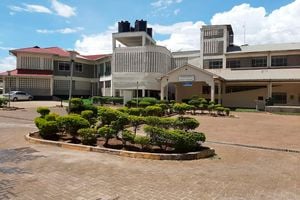
President William Ruto makes his address during the Ministerial performance contracts signing held at State House.
Just over two years into his tenure, President William Ruto is confronted with major crises affecting key sectors even as the 47 counties threaten to shut down their operations citing a cash crunch.
Critical sectors of education and healthcare are currently in limbo following unending lecturers’ strike that has paralysed learning in public universities as well as the chaos in the new Social Health Insurance Fund (Shif) that has left patients stranded in hospitals.
In the counties, employees have gone for months without salaries following a ping-pong between the national government and the devolved units, with the Council of Governors (CoG) issuing a 30-day notice to shut down county operations should Parliament fail to agree on Sh400 billion shareable revenue. Treasury has ruled out the additional Sh20 billion.
Should counties grind to a halt, it will further worsen the health crisis since healthcare is devolved with most facilities run by county governments.
Without finances, counties will struggle to stock up drugs as patients suffer in the hands of medics on a go-slow over salary arrears.
In public universities, restless students abandoned by dons who have walked out of lecture halls to demand higher pay are also threatening unrest.
But in the face of the ballooning crises in the country’s crucial sectors, President Ruto, who appears to acknowledge the crisis in the health sector, remained bullish that things would soon work out for the better. The President, who spoke at State House during the signing of performance contracts by Cabinet Secretaries (CSs), said ‘naysayers will be confounded’.
“We have taken the responsibility of Universal Health Coverage. I know two successive Presidents have attempted and they did not quite succeed. We have decided that this time round we must get it right.
“Difficult yes. But rather than lament about a not-so working NHIF, an NHIF that has bills dating 10, 15 years, we have decided to correct that situation. I promise you, we will confound the naysayers. We will succeed,” said President Ruto.
Implementation of the new healthcare scheme has been hit with major confusion, amid reports that there was a hurry by Kenya Kwanza administration to tap into the billions raised from the 2.7 percent deductions from the gross pay of all salaried workers. The roll-out of Shif was initially set for April before being pushed to July 1, then again postponed to October 1 amid challenges with the digital platform designed to support contributions and registrations.
Even by the time the government was rolling out on October 1, a number of structures had not been put in place, including numerous hospitals failing to log into the system.
The system has been characterised by delays that have seen patients detained in various hospitals. Some critically ill patients are skipping lifesaving sessions because hospitals are demanding cash upfront.
But government officials have continued to defend the rollout.
Health Cabinet Secretary Deborah Barasa on Monday pleaded for patience from Kenyans.
“Let’s give the SHA time to stabilise. This is work in progress. We still have some teething problems but are working to make it succeed,” said Dr Barasa.
Council of Governors (CoG) Chairperson Ahmed Abdullahi on Monday said counties will shut down their operations in the next 30 days should the two Houses of Parliament fail to agree on the amounts to be disbursed to the 47 devolved units.
The National Assembly and the Senate are currently in a raging standoff over shareable revenue for the 47 counties.
Senators want counties to be given Sh400 billion while Members of the National Assembly have proposed Sh380 billion.
The standoff over the Sh20 billion difference has persisted even after formation of an 18-member mediation committee that consists of equal members from the two Houses.
“The council takes great exception to the National Assembly’s decision to reduce the county equitable share by Sh20 billion,” Mr Abdullahi said.
“We affirm and support the Senate’s decision to retain county allocation at Sh400 billion…Any reduction to county equitable share will negatively affect service delivery and grind the counties to a halt,” he said after the council’s extra-ordinary meeting at the CoG headquarters.
The CoG has called on the Senate to expeditiously pass the County Allocation of Revenue Act to resolve the delay.
They also want the Treasury to immediately release funds owed to counties, “failure to which, county governments will have no choice but shut down operations completely”.
But National Treasury CS John Mbadi said he had disbursed Sh30.8 billion to the counties, clearing all arrears except November’s.
Mr Mbadi also told governors that the government has no money to support Sh400 billion shareable revenue as proposed by the Senate. He said revenue collection had fallen short from projected Sh2.9 trillion to Sh2.6 trillion this year.
"Governors should just accept Sh380 billion this financial year only as we work ways out of enhancing the figure next year.
"I would love to give counties more money but I'm strained, our economy can't just support it for now. This financial year is already in a mess, let's be realistic. There is no point in promising something that the economy cannot support for now," Mr Mbadi said.
Machakos Deputy Governor Francis Mwangagi told Nation that there are counties where employees have gone for three months without salaries.
Mwangagi said counties also experience delays in accessing their own-source revenue because of the requirement that bars counties from spending before having it remitted to accounts held at Central Bank of Kenya (CBK).
“Devolution is at its lowest. Majority of counties have not paid salaries. If a county cannot pay salaries it means it cannot finance even the essential services like buying drugs in the hospitals,” said Mr Mwangangi.
In Taita Taveta County, employees interviewed by Nation on Tuesday said they are yet to receive October salaries.
In a recent internal memo from the county government, the workers were informed to expect the delay due to late disbursements from the national government.
A similar situation is facing employees of Lamu and Kwale county governments where staff have not been paid their October salaries.
An employee in Kwale said allowances have not been remitted since last year.
Bank overdrafts
In Kilifi, Governor Gideon Mung’aro said the county government resorted to bank overdrafts to avert industrial action by the employees.
Mwangangi said that it could be true that National Treasury has disbursed Sh30.8 billion to counties, but said it would still take time before the monies hit their accounts for the devolved units to finance their activities.
“It is very unfair for the counties. There are people who don’t believe in devolution and are systematically killing devolution,” he added.
In the education sector, learners in public universities have been stranded in the institutions with no learning. Their lecturers have been on a strike that began in October.
Besides, universities have also been thrown into confusion after the State suspended the new funding model. The decision was made following a September court order that declared the new funding model illegal.
Even before the court made the decision, the model had been rocked with claims that it was locking out brilliant students from pursuing courses considered prestigious because of the cost element.
Some were also reportedly placed in wrong bands and made to pay higher fees despite coming from a humble background.
Lecturers in public universities have been on strike for four weeks, causing widespread disruption to academic activities across the country. They have vowed not to return until the unfulfilled 2021-2025 pact is fully implemented.
Uasu Secretary-General Constantine Wesonga has said Education Cabinet Secretary, Julius Migos Ogamba was misguided when he was told that lecturers had agreed to go back to work after the government’s verbal offer of Sh4.3 billion, which was aimed at ending the lecturers’ strike.
“The return-to-work formula is very clear, it is 10 percent, seven percent and foru percent, totalling to Sh9.7 billion. It has only been four weeks now; we are willing to stay out for as long as it will take.
“Uasu members have maintained their stand and we will not return to work until all our demands are met,” Dr Wasonga said.
In Moi University, learners have endured a long stay in the institution without learning over the current battle between the staff and the management.
The institution has been rocked by allegations of misappropriation of funds, with the university failing to meet its financial obligations, including remittance of statutory deductions and salaries.
The institution’s officials summoned by the Ethics and Anti-Corruption Corruption Commission (EACC) over corruption on Monday started recording statements.
EACC is probing possible loss of funds in the infrastructural projects whose costs are estimated at Sh2.2 billion.
Vice chancellor, Prof Isaac Kosgey, Chief Accountant Egla Samoei, Head Procurement Wilson Bett and Head of development unit Moses Kipkulei are some of the officials listed for grilling.
The investigations come in the wake of a prolonged standoff between the university management and its workers who have been on strike for the last two months over non-payment of salaries and other dues amounting to Sh8.6 billion.
The Moi University management is yet to strike a return-to-work deal with workers through their unions.











